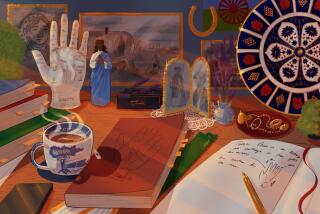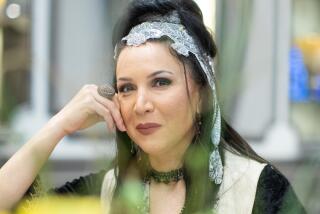Spreading a mystic’s message of respect
- Share via
A meeting with a fiery wandering dervish, Shams Tabrizi, was the transformative event in the life of legendary 13th century Sufi mystic, scholar and poet Jalaluddin Rumi.
From that time forward, Rumi would be guided by a passionate conviction that the path to God was to be found from within, rather than in scholarly study, and by a belief in love that embraced all religions.
This short but profound connection between two towering spiritual leaders, and its aftermath, is the subject of Djanbazian Dance Foundation’s “Rumi: Path to Enlightenment,” a new, multilayered work weaving contemporary dance; antique Middle Eastern instrumentation; vocalists; poetry recitation; improvised, signed movement; and the religious ritual of whirling dervishes begun by Rumi.
The piece, choreographed by the company’s artistic director, Iranian-born Anna Djanbazian, with featured dancer Aida Amirkhanian, will have its world premiere at UCLA’s Freud Playhouse on Saturday and Sunday.
It was the musicality of Rumi’s Persian poetry, the still deeply influential Sufi master’s use of metaphor and his message of love and respect that inspired Djanbazian, she explained in a phone interview.
His life is a story of love, she said, and her company -- the winner of multiple Lester Horton Awards, which honor excellence in Southern California dance -- will tell it in layers, “melting from one thing to another, taking you through that journey until you hopefully become that love.”
When Rumi transformed his life and found a new path to God, she said, “he looked at the whole world differently and became a friend of every religion. At his burial, Muslim, Christian and Jews all were there, showing they respected him because of the way he treated people.”
And that included women.
“Eight hundred years ago,” Djanbazian observed, “women were not very respected. [Rumi] respected everyone’s being. To him, every race, every religion, every nation was equal.
“I wish that everybody could think that way,” she added on a wistful note. “Especially now. We are so busy separating ourselves instead of coming together.”
-- Lynne Heffley
More to Read
The biggest entertainment stories
Get our big stories about Hollywood, film, television, music, arts, culture and more right in your inbox as soon as they publish.
You may occasionally receive promotional content from the Los Angeles Times.









